Business
Trump sends letters to 17 Big Pharma companies demanding they end ‘abusive drug pricing’

From LifeSiteNews
Trump warned the leaders of Pfizer, AstraZeneca, and other Big Pharma corporations that his administration ‘will deploy every tool in our arsenal’ to end inflated drug prices.
President Donald J. Trump sent letters on Thursday to 17 leading pharmaceutical manufacturers outlining the steps they must take to bring down the prices of prescription drugs in the United States to match the lowest price offered in other developed nations.
Trump called on the pharmaceutical giants to provide most-favored-nation (MFN) prices available to overseas customers to U.S. consumers, specifically mentioning “to every single Medicaid patient.”
Looking to the future, his letter also requires MFN pricing for all newly-launched drugs.
The letters inform manufacturers that if they “refuse to step up,” the federal government “will deploy every tool in our arsenal to protect American families from continued abusive drug pricing practices.”
Identical letters were sent to AbbVie, Amgen, AstraZeneca, Boehringer Ingelheim, Bristol Myers Squibb, Eli Lilly, EMD Serono, Genentech, Gilead, GSK, Johnson & Johnson, Merck, Novartis, Novo Nordisk, Pfizer, Regeneron, and Sanofi.
Trump signed a sweeping executive order (EO) in early May, “Delivering Most-Favored-Nation Prescription Drug Pricing to American Patients,” in which he said that drug manufacturers “deeply discount their products to access foreign markets, and subsidize that decrease through enormously high prices in the United States.”
“The inflated prices in the United States fuel global innovation while foreign health systems get a free ride,” said Trump in his EO.
“This abuse of Americans’ generosity, who deserve low-cost pharmaceuticals on the same terms as other developed nations, must end,” he demanded.
“Right now, brand name drug prices in the United States are up to three times higher on average than elsewhere for the identical medicines,” began Trump in his letter to Big Pharma corporate heads. “This unacceptable burden on hardworking American families ends with my Administration.”
“Most proposals my Administration has received to ‘resolve’ this critical issue promised more of the same: shifting blame and requesting policy changes that would result in billions of dollars in handouts to industry,” wrote Trump.
“Moving forward, the only thing I will accept from drug manufacturers is a commitment that provides American families immediate relief from the vastly inflated drug prices and an end to the free ride of American innovation by European and other developed nations,” he explained.
The president demanded action from the pharmaceutical companies within 60 days.
“Make no mistake: a collaborative effort towards achieving global pricing parity would be the most effective path for companies, the government, and American patients. But if you refuse to step up, we will deploy every tool in our arsenal to protect American families from continued abusive drug pricing practices,” warned the president.
“Americans are demanding lower drug prices, and they need them today,” noted Trump.
“Other nations have been freeloading on U.S. innovation for far too long: it is time they pay their fair share.”
Business
Less Talk, More Action

From the National Citizens Coalition
Meetings, meetings, and more meetings…
If Prime Minister Mark Carney could turn meetings into an Olympic sport, he’d be a gold medalist. At the recent Council of Federation meetings, the emphasis was on how well everyone gets along and how things are already in motion. Just trust the process, and results will follow. However, many Canadians — myself included — are still waiting for tangible outcomes.
(We also couldn’t sit idly by and watch those in attendance ignore immigration, and we were thankful that pressure eventually forced the premiers to address immigration.)
To be fair, I acknowledge that Carney has only been in office for a short time, so a comprehensive evaluation of his performance might be premature. That said, I find his approach heavy on rhetoric and light on action, though I sincerely hope he proves us wrong. The public is eager for concrete steps, not just promises. Here are some practical suggestions to move things forward.
- First, repeal Bill C-69, often called the “no more pipelines” bill, which creates uncertainty for investors. Despite premiers Ford, Smith, and Moe signing agreements to support pipeline construction and the development of rare earth mineral mines — resources the world desperately needs — potential investors remain skeptical without clear economic stability. And B.C., Quebec, and even Manitoba represent major potential road blocks to national projects. Investors are not swayed by symbolic gestures; they want policy changes that ensure predictability.
- Second, Carney should be upfront about Canada’s trade realities. While he claims to have held 90 bilateral meetings with countries interested in investing in Canada, the United States remains our most critical trading partner due to geographic proximity. The idea of drastically shifting exports from the U.S. to the European Union is unrealistic. Diversify, absolutely. But shipping costs to Europe and Asia are significantly higher, and geography will always play a decisive role in trade dynamics.
- Third, it’s time to address Canada’s outdated supply management system, particularly in Quebec, where farmers are protected by quotas that lead to millions of liters of milk being dumped annually. This system inflates prices for Canadians and hinders trade deals, especially with the U.S. A bold solution would be to buy out farmers’ quotas at full market value and guarantee their sales levels for 5 to 10 years. If their sales drop after the market opens, a formula-based compensation could make them whole. The cost of this buyout and transitional support would be a fraction of what Canadians currently pay for overpriced milk and other protected products.
While the National Citizens Coalition strongly supports free markets, we recognize the need for pragmatic solutions in a fast-moving world. These issues don’t require endless meetings or self-congratulatory talk about progress. Working Canadians deserve decisive leadership and measurable results — on cartels being torn down, immigration, crime, housing, healthcare, and getting energy projects built and out to market.
Together, we’re changing the conversation, holding politicians to account, and expanding the social license for the projects and priorities we need to get this country back on track.
As our month-end approaches, we’re working to meet our fundraising goals and need your support. We’re aiming to raise $5,000 in the next week to fund our initiatives, including new industry-leading advertising and messaging. And we have some big news to come shortly that we’re excited to share!
Please consider donating today and sharing our message with friends and colleagues who might also support the cause of Canadian renewal, and more freedom through less government. Thank you for your ongoing commitment. We never take it for granted.
Peter Coleman
President
National Citizens Coalition
Business
Turns out that there is a business case for exporting LNG to Europe

From Resource Works
The EU-US trade deal includes provisions for American energy exports, including LNG that Canada could have supplied. Canada must not make the same mistakes in the Pacific.
The trade deal signed between the European Union and the United States is a slap in the face for Canadian energy. American oil, natural gas, and even nuclear fuel, are now slated to flow across the Atlantic to European buyers, as the bloc pushes to fully wean itself off Russian energy.
It should have been Canadian liquefied natural gas (LNG) from the Atlantic coast.
Canada had every chance to build a thriving LNG industry on its East Coast. But short-sighted, hesitant government policy has consistently dismissed what has now proven to be a strong and viable business case.
The $750 billion energy trade deal between the EU and the US shows how costly that’s been.
Former Prime Minister Justin Trudeau repeatedly said Atlantic LNG was never economically viable. He famously told a 2022 press conference with German Chancellor Olaf Scholz that there’s “never been a strong business case” for exporting Canadian LNG from the East Coast.
Trudeau cited distance and infrastructure challenges, saying Canadian gas was uneconomic for direct export to Europe. Trudeau’s dismissal led to Germany signing a 15-year LNG deal with Qatar later that same year, in the first reminder of what Canada missed out on.
Reality contradicts the former Prime Minister’s pessimism. European leaders, desperate for energy after Russia’s invasion of Ukraine in 2022, repeatedly approached Canada with LNG requests. Chancellor Scholz came to Canada, followed by Japanese Prime Minister Fumio Kishida in 2023, and Greek Prime Minister Kyriakos Mitsotakis and Polish President Andrzej Duda in 2024.
Each time they received vague assurances and non-commitments from Trudeau’s government. Europe’s need was real, urgent, and sustained, but Canada’s response was inadequate.
As the Fraser Institute pointed out in May 2024, transitioning coal-dependent countries like India to natural gas would achieve four times more global emission reductions than shutting down Canada’s entire economy. Furthermore, Resource Works CEO Stewart Muir said natural gas isn’t just a “bridge fuel,” but a destination fuel for global energy stability.
But Canada chose domestic political caution and lofty green ideals, and ignored the broader global emission reduction opportunities. The results are clear.
The new US-EU trade deal, which guarantees $250 billion a year in American LNG purchases for the next three years, is exactly the kind of long-term market Canada could have had years ago. US LNG developers like NextDecade, Venture Global, and Cheniere Energy are already riding high on market confidence, and US natural gas producers are cashing in on the growing transatlantic demand.
Meanwhile, Canada’s Atlantic provinces are missing out on the jobs and prosperity that would have come with robust LNG development.
Trudeau’s own Energy Minister, Jonathan Wilkinson, said last March that Canada wouldn’t subsidize future LNG projects, calling them “inefficient fossil fuel subsidies.”
The regulatory framework, Bill C-69, and BC’s CleanBC plan further added to investor uncertainty, with long approval timelines and strict emission caps. As a result, Canada has seen $670 billion in resource projects cancelled since 2015, including critical Atlantic LNG projects.
Ironically, Canada’s hesitation has inadvertently increased global emissions, as Europe and Asia revert to coal due to the lack of reliable gas supplies. That’s the opposite of Trudeau’s climate goals, proving that Canada’s cautious approach to LNG was not only economically short-sighted but environmentally counterproductive.
Today, as US LNG terminals thrive and European reliance on American energy deepens, Canada must recognize that what our leaders said did not exist was always real. The “business case” Trudeau dismissed as weak was strong enough for our southern neighbours to jump at.
Canada’s indecision has left it on the sidelines, as the economic and strategic benefits flow to those who had the will to build.
All is not yet lost. Canada is still ahead of the US on supplying LNG to the Asia-Pacific, with LNG Canada in the first year of operation. Cedar LNG and Ksi Lisims LNG will soon join them in supplying Canadian LNG to Japan, South Korea, and others.
If the Atlantic opportunity has passed, ensuring that a Pacific LNG export industry can thrive is a necessity for Canada’s energy future.
-

 Censorship Industrial Complex4 hours ago
Censorship Industrial Complex4 hours agoLawyer Suing Gates & Bourla for Covid VAX Injuries Arrested and Imprisoned in Netherlands
-

 Bruce Dowbiggin6 hours ago
Bruce Dowbiggin6 hours agoWJC 2018 Scandal: Why Did The Crown Ever Send This Case To A Trial?
-

 Business7 hours ago
Business7 hours agoTurns out that there is a business case for exporting LNG to Europe
-

 Business5 hours ago
Business5 hours agoLess Talk, More Action
-

 Digital ID2 hours ago
Digital ID2 hours agoCanada’s Liberal government moves forward with plans for digital ID system
-

 Opinion3 hours ago
Opinion3 hours agoThe Climate Alarmism Grift is Dying
-

 Bruce Dowbiggin2 days ago
Bruce Dowbiggin2 days agoWhy Only Christians Are Singled Out For Censure In Carney’s Canada
-

 Daily Caller2 days ago
Daily Caller2 days agoNew Analysis Blows Massive Hole In Climate Catastrophe Narrative


